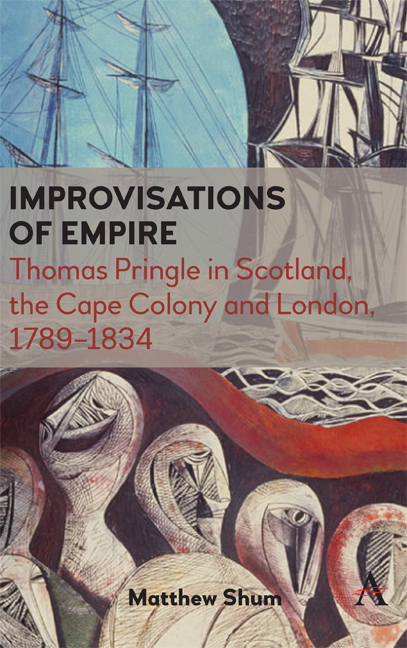2 - The Eastern Cape Frontier: 1820– 22
Published online by Cambridge University Press: 06 May 2020
Summary
We have no detailed understanding of the circumstances in which Pringle and his family chose to abandon their native country and emigrate to the Cape Colony. The closest we get is this passage early in the Narrative:
It may be proper here to notice that I had two special objects in view in emigrating to the Cape. One of these was to collect again into one social circle, and establish in rural independence, my father's family, which untoward circumstances had broken up and begun to scatter over the world. To accomplish this, emigration to a new colony was indispensable. My father had been a Roxburghshire farmer of the most respectable class; and all his sons (five in number) had been bred to the same profession, except myself. The change of times, however, and the loss of capital, had completely overclouded their prospects in our native country; and therefore, when the Government scheme of colonizing the unoccupied territory at the Cape was promulgated, I called their attention to the colony, and offered to accompany them, should they proceed to determine thither as settlers. After maturely weighing the advantages of the Cape, as compared with other British colonies, they made their election, and empowered me to apply on their behalf to the Colonial Department. (1966, 3)
This passage registers the geopolitical reverberations of a shifting world system in which a tenant farming family from the Scottish Lowlands is “scatter[ed] over the world” and where displacement from one national space becomes displacement into another. For just as the practices of agricultural improvement serve to evict the Pringle family from the tenancy of their farm, so to do modernizing imperatives drive the Xhosa and other indigenes from the territories that the Scottish settlers are to occupy. And while for the occupying colonists the intent of their chosen spatial displacement is to restore the state of “rural independence” of which they had been deprived (i.e., by their own reckoning, to move backward in time before moving forward), for the colonized the consequences are more calamitous: they experience an unprecedented acceleration in time, a shattering, with their present tense forced to become a “distant point,” to use Scott's phrase, as they are hurtled into an enforced futurity.
- Type
- Chapter
- Information
- Improvisations of EmpireThomas Pringle in Scotland, the Cape Colony and London, 1789–1834, pp. 39 - 92Publisher: Anthem PressPrint publication year: 2020



